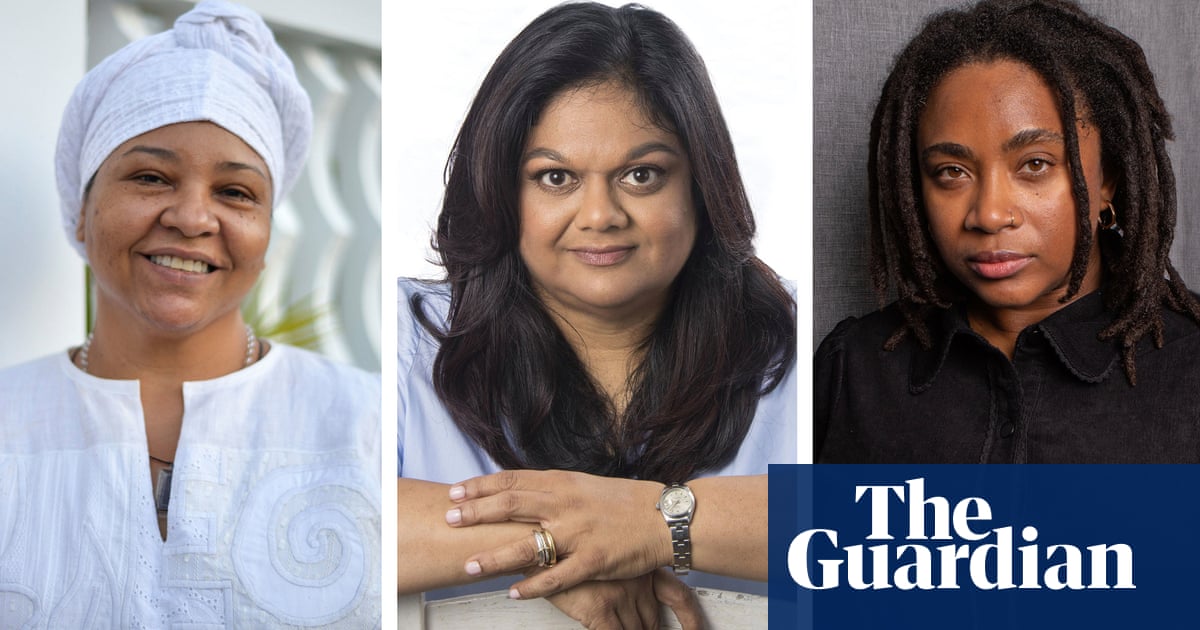
Show caption ‘There’s been a gender quake’ … Lisa Allen-Agostini, Ingrid Persaud and Ayanna Lloyd Banwo. Composite: PR, Antonio Olmos Books ‘The pendulum has swung’: Why we female Trinidadian writers are having our moment Monique Roffey, the Costa-winning author of The Mermaid of Black Conch, on the lit-boom that’s happening on the Caribbean island Monique Roffey Tue 3 May 2022 14.03 BST Share on Facebook
Share on Twitter
Share via Email
Last week, Trinidadian writer Lisa Allen-Agostini’s novel The Bread the Devil Knead landed a coveted spot on the Women’s prize shortlist. As a fellow Trinidadian writer, this is both exciting and unsurprising. These days Trinidad is producing world-class female writers hand over fist. Allen-Agostini’s shortlisting comes on the heels of the announcement, two weeks ago, that Trinidadian writer Amanda Smyth had made the Walter Scott prize for historical fiction shortlist, the only woman on the list, and the first Caribbean writer ever to be chosen. Meanwhile, Celeste Mohammed has become the fifth woman (and third Trinidadian woman) to win Trinidad’s regional OCM Bocas prize.
Something has happened in Trinidad, in our small but dense hothouse of a literary world. Perhaps it’s 12 years of the NGC Bocas literary festival, or five waves of feminism, or maybe it’s to do with the internet opening up opportunities for those from developing countries, but in the last decade Trinidad has produced a host of outstanding female writers. It’s a trend that anyone in Caribbean literary circles knows about. Myself, Smyth, Allen-Agostini, Mohammed and others are part of a “lit-boom”, and most of this boom is female. We are finding ourselves on the global stage, on prestigious shortlists in North America and the UK. This huge generational and gender shift would have been unthinkable only 15 years ago.
What makes this upsurge in our female literary talent so exquisitely satisfying is that not long ago, in 2011, Trinidad’s most famous writer, supernova VS Naipaul, scorned women who write. During an interview with the Royal Geographic Society he said, “I read a piece of writing and within a paragraph or two I know whether it is by a woman or not. I think [it is] unequal to me.” He went on to say this was because of women’s “narrow and sentimental view of the world”.
Many more Trinidadian female writers are emerging as I write: expect an avalanche
Many more female Trini writers are emerging as I write: readers can expect an avalanche. There’s Ayanna Lloyd Banwo (her novel When We Were Birds is currently on tour), Ira Mathur, Alake Pilgrim, Hadassah K Williams, Breanne Mc Ivor, Judy Raymond, Desiree Seebaran. It’s like someone has turned on a tap.
The NGC Bocas festival, launched in 2011, has been critical to this upsurge. Not only does Bocas showcase Caribbean writers, but it is committed to nurturing talent via workshops and longer mentoring schemes. Bocas has given Trinidad’s fledgling writers a structure, something to lean into. It brings our emerging writers into contact with the region’s established writers. In short, it has given us all confidence.
Then there is Trinidad itself. I call it “the place”. Charismatic, polyglot, sexycool, rife with corruption and discontent, cursed with anti-LGBT colonial laws, only just free from child marriage, a place where one in three women know domestic violence, divided historically and racially along African and Indian lines; it is a place to write about. It’s also a place to celebrate; we own carnival, calypso, once an international film festival and today a top-notch literary festival. We are a multifarious racial mix, and our writers reflect this: Muslim, Christian, Buddhist, Hindu, African, Indian, European. Our current wave of talent reflects no single narrative. It is a place of fusion and globalisation by means of colonisation, immigration and indenture. It’s hardly surprising, then, that Trinidad has spawned many famous writers: VS Naipaul, CLR James, Earl Lovelace, Sam Selvon, to name a few.
But the pendulum has swung. There’s been a gender quake: the present and the future, in terms of Trinidad’s literary output, is female.
• This article was amended on 4 May 2022. An earlier version referred to the OCM Bocas Festival. Whilst OCM sponsors a prize, the festival’s title sponsor is now NGC. Also Vahni Anthony Ezekiel Capildeo’s name was updated to the full name they now use.







